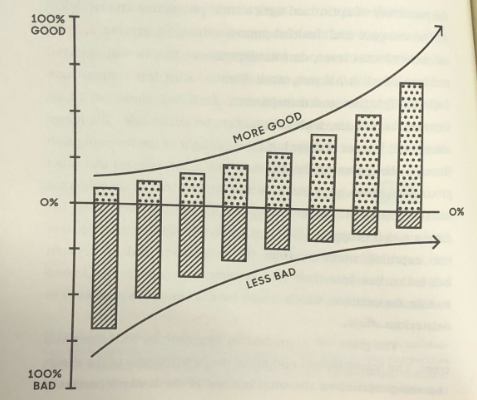Would it Kill Environmentalists to be a Little Nicer?
Why are environmentalists no fun?
A few years ago, Daniel attended a sustainability conference and was awed by one presentation. A company flew drones filled with medicine to hard-to-reach areas and dropped packages to communities like a Call of Duty game. These areas didn't have adequate road infrastructure so trucking goods wasn't an option. When the presentation was over, a concerned environmentalist asked, "Are the packages the drones drop compostable or recyclable? Aren't you just dropping trash in poor parts of the world?"
A company that tries to save people's lives is being confronted by someone whose immediate reaction is to bring up trash. Why are we, environmentalists, like this?
When Leonardo DiCaprio made a documentary about climate change, environmentalists were quick to criticize, “But he takes private jets.” A major corporation commits to a 2050 climate goal, “Not fast enough.” Daniel posted a video showing a reusable cup washer from Starbucks and, “Too much water” was the response.
The Earth faces many complex and urgent environmental problems. In the sustainability field, we call them "wicked problems." Problems so vast and complex that it's hard to pinpoint where they even start. One cannot solve wicked problems through a single solution. This haunts the psyche of any changemaker working on them. Anyone who says, "This is not enough," is right but is also misunderstanding the scope and complexity of the problem.
Most environmentalists have a "less bad" mindset. In their mind, the proper way to do good for the environment is to do less of something harmful. Less driving, eating less meat, less, less, less. William McDonough and Michael Braungart describe this mindset in their book Cradle to Cradle, in a chapter titled, “Why Being ‘Less Bad’ Is No Good.”

Since this mindset is pervasive around environmentalism, it’s hard for people to imagine what “more good” looks like. Let's take an office building for example. Instead of thinking about how to reduce the impact of this building by 50%, imagine how it can have a positive impact on climate and biodiversity. A building that creates more energy than it uses and provides habitat for wildlife, while still functioning as great office space. That is a building that does “more good.”
Instead, environmentalists stick to harping on corporations to do “less bad.” When combined with the fact that we can't solve wicked problems right away, change feels distant and insufficient, thus creating a cycle of psychological losses that make environmentalists feel like they are always losing the battle.
Enduring so many losses will make anyone cynical. Even if these losses are perceived, they still have consequences. 45% of young people say climate anxiety affects their daily life. In our discussion about this topic, McCady said, “I spent most of grad school upset.” Depression, anxiety, and anger are not sustainable emotions if we are to endure long enough to make the changes we want to see in the world.
This cynical behavior discourages people, organizations, and governments from taking action. Our behavior is playing defense against the change we want. Change is vulnerable. Nobody wants to be vulnerable and then have people yell at them for not changing fast enough.
The feeling of losing the battle makes environmentalists more radical, And feel as if they have to go for the home run to catch up. If you were to pin an environmentalist into a corner, it wouldn't be change they want, it would be a revolution. They don't want ExxonMobil to invest in renewable energy; they want ExxonMobil to stop existing. Not only is this unrealistic, but it's also a radical position that makes the general public do a collective eye roll.
There is a legitimate argument to be made that incremental change is not good enough. There is well-documented research showing how fast we need to move to stop irreversible climate damage. There are also lots of organizations gaslighting the public. But, there are also lots of organizations and people trying to solve these issues and they get the same level of cynicism and pushback as the petrochemical giants. We're creating a bad environment (pun intended) for people with good intentions because they can't do anything without catching a stray cynical bullet. That's not helpful.
So what should we do instead? Celebrate the small wins and not constantly criticize, while still pushing for larger systemic change.
We should treat all attempts to do right by the Earth the same way we would treat somebody trying to lose weight. If somebody went from eating nine pop-tarts a day to eating two, that is progress. Don’t humiliate them right after they were vulnerable enough to share their effort with you. Instead, give them some words of encouragement (and… maybe… maaaybe, offer one, and only one tip on how to do better!) It’s much easier to tear down than it is to build up. Someone's effort to be a better environmental steward needs to be matched by your effort to show compassion for imperfectness. Without this, we will continue to operate at the fringes of mainstream society.
Milkman Model Newsletter
Join the newsletter to receive the latest updates in your inbox.

